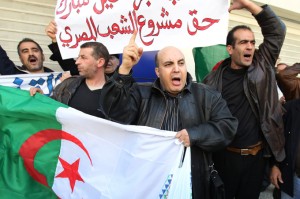How Did Algeria Differ in the Arab Spring Revolts?
In 2011, starting with the self-immolation of Bouazizi, a Tunisian street vendor, a wave of revolutions and protests swept across the Arab world. This series of protests and revolutions are popularly referred to as the “Arab Spring.” Almost every single Arab country participated in the Arab Spring in some form, and in North Africa, every single one produced some sort of reform or regime change—with the exception of Algeria.
What has been dubbed by some as “The Algerian Exception” is the puzzling lack of change produced by the Arab Spring in a country that seems to have all the conditions necessary for revolution project management apps. Indeed there was no shortage of unrest in 2011. There had been widespread riots and protests, nearly daily instances of self-immolation, and thousands of emigrants to neighboring Europe. These protests grew stronger after the government banned street vendors and raised prices on staple goods such as sugar and oil. In response, a diverse coalition of political groups created the National Coordination for Change and Democracy group, calling for reforms and regime change. Yet in light of all this social unrest, the Bouteflika regime still stands strong today. What sets Algeria apart from its neighbors, regimes that were unable to maintain the status quo in the face of public frustration?
 First, the Algerian government responded quickly and effectively to the unrest. Unlike the other Arab countries, the Algerian security forces did not respond violently to protests due to their experience in dealing with social unrest from the Algerian civil war. In addition, the government almost immediately reversed its decision to raise prices and ban street vendors. It also passed a series of laws that appeared to address the concerns of its population and their desire for reform. However, many of these bills were either only progressive in name or actually increased the powers of the government in key areas. The government also encouraged participation in the 2012 election, framing the election as a critical opportunity for the opposition to express their concerns. Still, the election was characterized by only a moderate turnout and a clear victory for the ruling party. Many Algerians thought and continue to believe that the 2012 election was rigged. International election monitors are mixed on the fairness of the election. Still, the elections added a degree of legitimacy to the Bouteflika regime.
First, the Algerian government responded quickly and effectively to the unrest. Unlike the other Arab countries, the Algerian security forces did not respond violently to protests due to their experience in dealing with social unrest from the Algerian civil war. In addition, the government almost immediately reversed its decision to raise prices and ban street vendors. It also passed a series of laws that appeared to address the concerns of its population and their desire for reform. However, many of these bills were either only progressive in name or actually increased the powers of the government in key areas. The government also encouraged participation in the 2012 election, framing the election as a critical opportunity for the opposition to express their concerns. Still, the election was characterized by only a moderate turnout and a clear victory for the ruling party. Many Algerians thought and continue to believe that the 2012 election was rigged. International election monitors are mixed on the fairness of the election. Still, the elections added a degree of legitimacy to the Bouteflika regime.
The other reason for Algeria’s relative calm lies in its long history of conflict. Though the opposition to the Bouteflika regime was diverse, much of Algeria’s population viewed it warily. The memories of the ten-year, bloody civil war still weighs heavily on the Algerian national consciousness. The ruling FLN party effectively portrayed itself as the only capable actor of maintaining stability in Algeria and much of the population will accept a degree of corruption in the name of stability. The ongoing terror threat is also actively used by the regime in order to justify certain authoritarian tendencies.
For more on the stalwart Bouteflika regime, take a look at The Lesson of Algeria published by The Economist in 2014. The New York Times also addresses the question of just Who Runs Algeria? as President Bouteflika’s health continues to decline.

